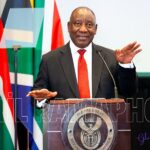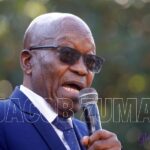Cyril Ramaphosa: Birth, History and Political Journey

Cyril Ramaphosa, the current President of South Africa, has risen to prominence as a key figure in the political and economic landscape of the nation. His journey, from humble beginnings to the helm of a country transitioning from apartheid to democracy, is a testament to his resilience, leadership, and dedication to the future of South Africa.
This Global Leaders View look into the life of Cyril Ramaphosa, exploring his early years, his remarkable achievements, and his impact on South Africa’s political, economic, and social landscape.
Early Life and Birth of Cyril Ramaphosa
Cyril Matamela Ramaphosa was born on November 17, 1952, in Soweto, a township in the southern part of Johannesburg, South Africa. As the son of a nurse and a teacher, Ramaphosa grew up in a working-class family, where he experienced firsthand the challenges of apartheid. His early life was shaped by the socio-political climate of South Africa, where systemic inequality and racial segregation were deeply entrenched in every aspect of life.
Ramaphosa’s formative years were marked by the Bantu Education Act, which imposed a substandard education system on black South Africans. Despite this, Ramaphosa excelled in his studies, showing a strong aptitude for leadership and academics. He attended Sekano-Ntoyi High School in Soweto, where his leadership qualities began to shine. His academic success opened doors for him to attend the University of the North, where he pursued a law degree, setting the stage for his future role in the political sphere.
Cyril Ramaphosa’s Early Career: From Activism to Leadership
Ramaphosa’s professional career began at the South African Congress of Trade Unions (SACTU), where he worked as a union organizer. This was a time of intense political unrest, as apartheid policies stifled the rights of black South Africans and fueled resistance movements. It was during this period that Ramaphosa became deeply involved in the African National Congress (ANC), the political party that would eventually lead the country’s fight against apartheid.
In 1982, Cyril Ramaphosa founded the National Union of Mineworkers (NUM), which would go on to become one of the most powerful labor unions in South Africa. Under his leadership, the NUM fought for better wages and working conditions for black mineworkers, challenging the deeply entrenched racial discrimination of the time. The union’s success not only elevated Ramaphosa’s standing within the ANC but also placed him at the forefront of the struggle for workers’ rights.
During the 1980s, the apartheid regime cracked down on anti-apartheid movements, and many leaders of the ANC were either imprisoned or forced into exile. Ramaphosa emerged as a prominent leader within the ANC’s ranks, despite being banned from public speaking. His role as a labor leader and his advocacy for the rights of black South Africans gained him widespread recognition and respect, both within the ANC and among the South African population at large.
Cyril Ramaphosa’s Role in the End of Apartheid
In the early 1990s, South Africa was at a crossroads. The apartheid regime, weakened by internal resistance and international pressure, began to negotiate with the ANC for the country’s transition to democracy. Ramaphosa was chosen as one of the key negotiators for the ANC during these talks. His ability to negotiate and find common ground between opposing parties was crucial in bringing about a peaceful transition.
In 1991, he became the ANC’s chief negotiator at the Convention for a Democratic South Africa (CODESA), where he worked tirelessly to secure a deal that would end apartheid and establish a democratic, multiracial government. His diplomatic skills and determination were essential in achieving the 1994 democratic elections, which saw Nelson Mandela elected as the first black president of South Africa.
Ramaphosa’s leadership during this transformative period in South Africa’s history earned him widespread acclaim. However, as the country entered its new phase of democracy, Ramaphosa chose to focus on business ventures, leveraging his political capital to become a key figure in South Africa’s growing economy.
Cyril Ramaphosa’s Business Success and Economic Influence
After the fall of apartheid, Cyril Ramaphosa’s talents extended beyond politics into the business world. In 1997, he founded Shanduka Group, a diversified investment holding company. Under Ramaphosa’s leadership, Shanduka Group grew into a significant player in various industries, including mining, real estate, and telecommunications. He also became involved in Mosaic Telecom, expanding his portfolio and establishing himself as one of the most influential business figures in South Africa.
Ramaphosa’s success in the business world did not go unnoticed. He became one of the wealthiest individuals in South Africa, with a fortune estimated at several billion dollars. His business acumen, combined with his deep understanding of South Africa’s socio-political landscape, positioned him as a key influencer in both economic and political spheres.
Despite his wealth and success, Ramaphosa’s focus remained on economic transformation, seeking to address the disparities that continued to plague South Africa’s black population. Through his business ventures, he advocated for greater black economic empowerment (BEE), a policy aimed at increasing the participation of black South Africans in the country’s economic activities.
Cyril Ramaphosa’s Rise to the Presidency
Cyril Ramaphosa’s return to the political spotlight came in 2012, when he was elected Deputy President of the ANC. His political career took a significant turn as he positioned himself as a candidate for the presidency of South Africa, particularly after the resignation of Jacob Zuma amid corruption scandals.
In 2017, Ramaphosa won the race to become the President of the ANC, defeating Nkosazana Dlamini-Zuma, the ex-wife of Jacob Zuma, in a contentious battle. His victory was seen as a triumph for the party’s reformist faction, which sought to distance itself from the scandal-ridden presidency of Jacob Zuma and restore the ANC’s reputation.
In February 2018, Ramaphosa became the President of South Africa after Jacob Zuma resigned following intense pressure from within his own party and from the public. Ramaphosa’s ascension to the presidency was met with optimism, as many believed he would bring much-needed change to South Africa, particularly in the areas of corruption, governance, and economic growth.
Challenges and Achievements as President
As president, Cyril Ramaphosa has faced a myriad of challenges, including high unemployment, economic stagnation, corruption scandals, and the aftermath of the COVID-19 pandemic. Despite these obstacles, Ramaphosa has made significant strides in trying to tackle these issues.
One of his first major accomplishments was his push for state-owned enterprise reform and anti-corruption measures. He established the Zondo Commission, an inquiry into state capture and corruption, which led to the exposure of widespread corruption within the government. Ramaphosa’s government has also sought to strengthen South Africa’s relations with international partners, aiming to attract foreign investment and bolster the country’s economic standing.
In terms of social reforms, Ramaphosa has been a proponent of land reform, focusing on redistributing land to black South Africans who were dispossessed under apartheid. His administration has made efforts to balance the need for economic stability with the demand for greater equality in land ownership.
Despite ongoing challenges, Ramaphosa’s leadership continues to be a beacon of hope for many South Africans, who view him as a figure who can guide the country towards a more inclusive and prosperous future.
Global Leaders View: The Legacy of Cyril Ramaphosa
Cyril Ramaphosa’s journey from his early life in Soweto to his presidency of South Africa is a story of resilience, ambition, and dedication. From his work in the labor movement and the end of apartheid to his influential role in South Africa’s economic transformation, Ramaphosa has left an indelible mark on the nation’s history. As president, his leadership is shaping the future of South Africa, and his legacy will be defined by the changes he brings to the country in the years to come.
Recent Posts
Related Articles
Milan Dordevic: Navigating Two Decades of Innovation and Leadership Internationally Across Industries
You’ve got to be serious at some things, at a particular age,...
ByGlobal Leaders ViewFebruary 5, 2025Yossi J Amuial: Steering the Course of Innovation and Excellence at Executive Tag & Title Svcs, Inc.
In the vast sea of leadership, true leaders emerge not by just...
ByGlobal Leaders ViewFebruary 5, 2025Lisa Anna Palmer: A Journey of Empowerment, Vision, and Impact
You can hate more but you can never love less. The hope...
ByGlobal Leaders ViewFebruary 5, 2025Krystn Macomber: From Athlete to Entrepreneur: The Journey of a Visionary CEO
Krystn Macomber knows winning. Going back to her days as a D1...
ByGlobal Leaders ViewFebruary 5, 2025














Leave a comment